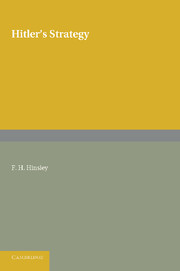Book contents
- Frontmatter
- Contents
- PREFACE
- Note on Sources and References
- CHAPTER I The German Navy, the Russian Pact, the British Problem and the Decision to Make War
- CHAPTER II The First Phase
- CHAPTER III The Invasion of Norway and the Fall of France
- CHAPTER IV An Invasion of England?
- CHAPTER V The Crucial Months, September to December 1940
- CHAPTER VI THE DECISION TO ATTACK RUSSIA
- CHAPTER VII North Africa, The Mediterranean and the Balkans in 1941
- CHAPTER VIII The Battle of the Atlantic in 1941
- CHAPTER IX German-Japanese Negotiations in 1941
- CHAPTER X 1942
- CHAPTER XI The End of the German Surface Fleet, January 1943
- CHAPTER XII Hitler's Strategy in Defeat
- APPENDIX A The German Surface Fleet
- APPENDIX B Germany's Infringements of the Naval Clauses of the Treaty of Versailles
- APPENDIX C The New U-Boats
- INDEX
CHAPTER IV - An Invasion of England?
Published online by Cambridge University Press: 05 June 2016
- Frontmatter
- Contents
- PREFACE
- Note on Sources and References
- CHAPTER I The German Navy, the Russian Pact, the British Problem and the Decision to Make War
- CHAPTER II The First Phase
- CHAPTER III The Invasion of Norway and the Fall of France
- CHAPTER IV An Invasion of England?
- CHAPTER V The Crucial Months, September to December 1940
- CHAPTER VI THE DECISION TO ATTACK RUSSIA
- CHAPTER VII North Africa, The Mediterranean and the Balkans in 1941
- CHAPTER VIII The Battle of the Atlantic in 1941
- CHAPTER IX German-Japanese Negotiations in 1941
- CHAPTER X 1942
- CHAPTER XI The End of the German Surface Fleet, January 1943
- CHAPTER XII Hitler's Strategy in Defeat
- APPENDIX A The German Surface Fleet
- APPENDIX B Germany's Infringements of the Naval Clauses of the Treaty of Versailles
- APPENDIX C The New U-Boats
- INDEX
Summary
Hitler's own thorough plans for the attack on France contained no provision for a subsequent attempt to cross the Channel; nor did he regard the rapid success of the French operation as providing an opportunity for an invasion of England. There is no reference to this project in the minutes of the Naval Conferences until 21 May, a whole month went by before it was next mentioned, on 20 June; and on neither of these occasions is Hitler recorded as having any interest in it. This negative evidence for his early lack of interest is reinforced from other directions. Almost certainly, it was on Raeder's initiative, and not on Hitler's that the subject was raised at all in May and June; the record of these meetings shows that Hitler was thinking on other lines at the time; after 20 June, although, on account of the remaining time available in 1940, a decision had become a pressing need, he remained uncertain for nearly another month. When, at last, on 15 July, he finally decided that the operation should be attempted, two months had gone by since the question was first raised, nearly one month since the defeat of France.
It was on 21 May 1940, at their first meeting since the opening of the Western land offensive, that Raeder and Hitler first discussed, ‘in private, details concerning the invasion of England, on which the Naval Staff has been working since November’. Far-sighted and forward in this matter, as he had been over the invasion of Norway, Raeder had ordered his staff to begin to prepare for an invasion of England as early as 15 November 1939. The order had been confined to the Naval Staff, neither Hitler nor the other two Services being informed—a fact which fits in with the view that it was on Raeder's initiative that the subject was now raised in conference for the first time. This assumption is also borne out by the testimony of German naval officers, at the end of the War, to the effect that Hitler showed no interest in the operation at this early stage.
- Type
- Chapter
- Information
- Hitler's Strategy , pp. 64 - 85Publisher: Cambridge University PressPrint publication year: 2013



